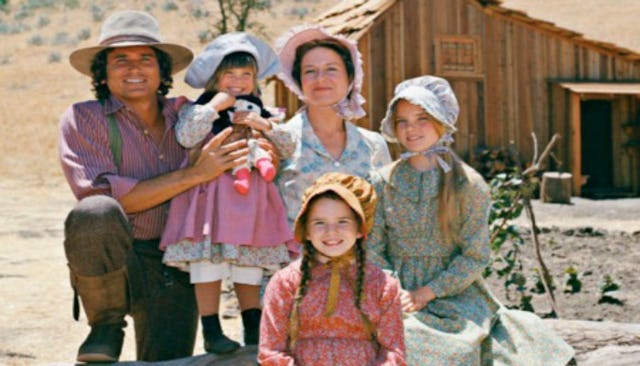8 Life Lessons From 'Little House On The Prairie'

Not long ago, I borrowed the complete DVD set, Season 1, of the 1970s/’80s TV series Little House on the Prairie from a friend. I envisioned curling up with my kids and exposing them to the simple joys of prairie life on the American frontier—maybe not an easier life, but a slower, simpler life in many ways. The wholesome programming would be a welcome diversion from mind-numbing, sarcasm-promoting shows like Jessie and Teenage Mutant Ninja Turtles. At least, that’s the way I saw it when we sat down to watch the series over the course of several weeks.
My husband, who had never seen the show before and only viewed the first few episodes with us, didn’t see it as quite so idyllic. He honed in on the harshness of frontier life—the stress and physical strain of living off the land—sucking all the joy right out of it. He pointed out, in particular, the backbreaking labor for all the menfolk back then (I’m assuming drug-free childbirth, that often ended in death, was an oversight on his part).
Gender roles aside, Little House on the Prairie is a great history lesson for kids. My 9-year-old read some of the books but was still fascinated with everything about the life of Laura Ingalls. There were a million questions: How does the mom bake bread in just a fireplace? Why is there a teenager in the same class with all the little kids? You mean the doctor goes to visit THEM?
These led to others about what life was like for me and their dad when we were little. We didn’t nearly perish in a blizzard, no, but we did survive all those years with just a rotary phone, no answering machine, and no computer (gasp!).
I’m still hopeful that we’ll get out for some of those real-life nature experiences with our kids, but watching Little House on the Prairie together took me right back to my own childhood. I wasn’t expecting to get so wrapped up in the stories of life on Plum Creek again. What I found was that I needed the return to simplicity just as much as my kids did.
Here’s a few things our TV ancestors, the Ingalls Family, had to teach us:
1. A quiet evening together at home does not involve typing, texting, viewing, gaming or electronics of any kind.
So remember, kids, the next time we declare it “family night” or call for an evening—maybe even an entire day—of no screen time (yes, TVs count), you may not see your “Ma” needle-pointing by gas lantern or “Pa” playing the fiddle while you and your brother do a little hoedown, but you sure as heck won’t see us scrolling through email or Minecraft, either. You can talk, read, play, relax, and then it’s up to the loft, sleep bonnets on and candles out!
2. Setting and clearing the table, feeding the pets, and cleaning your room are not ‘chores.’
They are. Say it with me now: family responsibilities. Chores are the things you do after your 5-mile walk home from school. They involve scrubbing your laundry with a tin board and a bucket of water, or squeezing your breakfast from an animal’s teat on a cold winter’s morn. That, child, is a chore. Best you appreciate the difference, now.
3. Be thankful for your health and, when you’re sick, the medical care at our disposal.
It’s not always easy to remember, but it’s a lot easier when you see Doc Baker prepare to pull Laura’s tooth with just some chloroform and a pair of pliers.
4. Everyone needs a ‘Mr. Edwards.’
That family friend who will be there for you no matter what, whether it’s to ride your kids around piggyback or search for days on horseback for your child who trekked to a mountaintop “to be closer to God.” He’s that someone you can call on in a pinch and who will come running, no questions asked.
5. Food does not come from a shelf; it comes from the earth.
Since the dawn of time (which, according to my 6-year-old, is when Little House on the Prairie took place), this is from where real food has always come. Sow it. Grow it. Pick it. Eat it. (Or at least buy it as fresh and as whole as possible). It takes a little more work to prepare, but it’s worth the effort. And, thank God, we have much better tools to work with than the good folks of Walnut Grove did.
6. You will never forget your favorite teacher.
Now, in the case of frontier children, this is your only teacher, for all of your school life, but you get the point. Cherish your “Miss Beadle,” and thank her every chance you get, for she is, truly, one-of-a-kind. And you never know, like with Laura, when she may one day pass the ringing of the schoolhouse bell down to you. Make her proud.
7. Playing alone at the creek, or with your sibling, is not a bad way to spend an afternoon.
Alone time and sibling time are often needed, and sometimes all that is available. They may not be as exciting as a wagon ride into “the city,” but when the horse is put up for the day, they can be a nice alternative.
8. There will always be a Nellie Oleson in your life.
The snooty schoolmate who has a much fancier petticoat, finer living quarters, and an endless supply of peppermint sticks from her parents’ mercantile. But remember, “country girl,” you have so much more in your little log home on the prairie: a loving family (including, might I add, a strapping and fine-lookin’ Pa) and a mess of wild animal friends.
The simple prairie life. Isn’t it still, today, all anyone really needs?
This article was originally published on